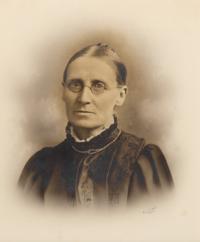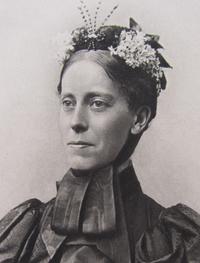Lucy Toulmin Smith(1838-1911)
First official librarian in the College’s history and the first female in charge of a library in Oxford.
Lucy Toulmin Smith, ‘keen scholar and woman of letters,’ was employed as the first official Librarian in the College’s history. She is credited as being the first woman to be in charge of a public library in England. She came to Oxford in 1894, a year after the College opened its new premises. She was fifty-six when she took up her post and transformed the college library, professionalising its processes and strengthening its collections, particularly its Unitarian material.

Beyond the Library, Smith continued to research and publish in her areas of interest, publishing scholarly editions of medieval and early modern English and French texts, a medieval commonplace book and a manual on grammar. She contributed to an array of periodicals, including the Atlanta, a title for young women, edited by her sister-in-law, the prolific writer L.T. Meade. She was a long-term contributor and reader for the Oxford English Dictionary, working with James Murray. She wrote articles for the Dictionary of National Biography, including one for Mary Kingsley, the celebrated solo female traveller to Africa, who was a friend of Smith’s from Highgate. It is said that Smith took Kingsley (portrait below) on her first trip abroad to Paris in 1888.

Quietly pioneering, Smith lived her entire life independently earning her living through scholarship, writing and professional positions. Before Oxford Smith, along with Dr Elizabeth Blackwell (the first women to receive a medical degree in the States), helped set up the National Health Society for which she was secretary for some years. The National Health Society was founded to spread contemporary information about Health through lectures and other means. Later Smith became a keen advocate for librarianship as a career for both educated and uneducated women, speaking on the subject at the 1899, International Congress of Women, held in London at Westminster Town Hall.
Smith remained as the College Librarian until her retirement in 1911, seventeen years after she arrived. The Committee noted on her resignation ‘her eminent literary abilities, sufficiently attested by the scholarly works which she had produced, have conferred distinction upon the College which she has served with such punctuality and faithfulness.’ She died only a month after she retired and is buried in Wolvercote cemetery.